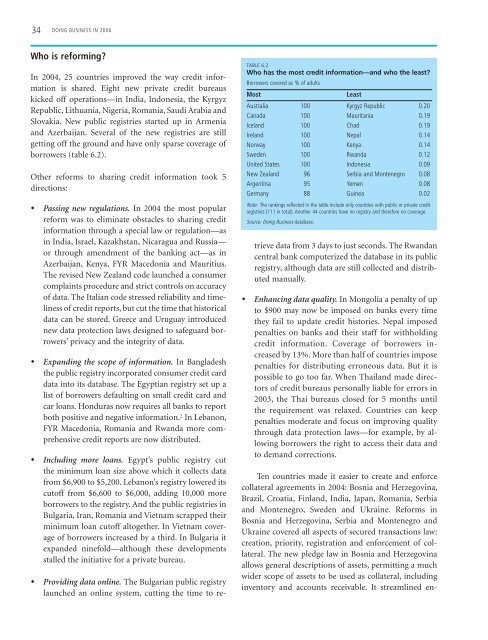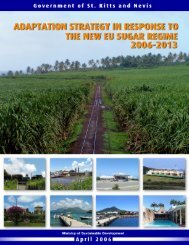Creating
Doing Business in 2006 -- Creating Jobs - Caribbean Elections
Doing Business in 2006 -- Creating Jobs - Caribbean Elections
You also want an ePaper? Increase the reach of your titles
YUMPU automatically turns print PDFs into web optimized ePapers that Google loves.
34 DOING BUSINESS IN 2006<br />
Who is reforming?<br />
In 2004, 25 countries improved the way credit information<br />
is shared. Eight new private credit bureaus<br />
kicked off operations—in India, Indonesia, the Kyrgyz<br />
Republic, Lithuania, Nigeria, Romania, Saudi Arabia and<br />
Slovakia. New public registries started up in Armenia<br />
and Azerbaijan. Several of the new registries are still<br />
getting off the ground and have only sparse coverage of<br />
borrowers (table 6.2).<br />
Other reforms to sharing credit information took 5<br />
directions:<br />
• Passing new regulations. In 2004 the most popular<br />
reform was to eliminate obstacles to sharing credit<br />
information through a special law or regulation—as<br />
in India, Israel, Kazakhstan, Nicaragua and Russia—<br />
or through amendment of the banking act—as in<br />
Azerbaijan, Kenya, FYR Macedonia and Mauritius.<br />
The revised New Zealand code launched a consumer<br />
complaints procedure and strict controls on accuracy<br />
of data. The Italian code stressed reliability and timeliness<br />
of credit reports, but cut the time that historical<br />
data can be stored. Greece and Uruguay introduced<br />
new data protection laws designed to safeguard borrowers’<br />
privacy and the integrity of data.<br />
• Expanding the scope of information. In Bangladesh<br />
the public registry incorporated consumer credit card<br />
data into its database. The Egyptian registry set up a<br />
list of borrowers defaulting on small credit card and<br />
car loans. Honduras now requires all banks to report<br />
both positive and negative information. 2 In Lebanon,<br />
FYR Macedonia, Romania and Rwanda more comprehensive<br />
credit reports are now distributed.<br />
• Including more loans. Egypt’s public registry cut<br />
the minimum loan size above which it collects data<br />
from $6,900 to $5,200. Lebanon’s registry lowered its<br />
cutoff from $6,600 to $6,000, adding 10,000 more<br />
borrowers to the registry. And the public registries in<br />
Bulgaria, Iran, Romania and Vietnam scrapped their<br />
minimum loan cutoff altogether. In Vietnam coverage<br />
of borrowers increased by a third. In Bulgaria it<br />
expanded ninefold—although these developments<br />
stalled the initiative for a private bureau.<br />
TABLE 6.2<br />
Who has the most credit information—and who the least?<br />
Borrowers covered as % of adults<br />
Most<br />
Least<br />
Australia 100 Kyrgyz Republic 0.20<br />
Canada 100 Mauritania 0.19<br />
Iceland 100 Chad 0.19<br />
Ireland 100 Nepal 0.14<br />
Norway 100 Kenya 0.14<br />
Sweden 100 Rwanda 0.12<br />
United States 100 Indonesia 0.09<br />
New Zealand 96 Serbia and Montenegro 0.08<br />
Argentina 95 Yemen 0.08<br />
Germany 88 Guinea 0.02<br />
Note: The rankings refl ected in the table include only countries with public or private credit<br />
registries (111 in total). Another 44 countries have no registry and therefore no coverage.<br />
Source: Doing Business database.<br />
• Providing data online. The Bulgarian public registry<br />
launched an online system, cutting the time to retrieve<br />
data from 3 days to just seconds. The Rwandan<br />
central bank computerized the database in its public<br />
registry, although data are still collected and distributed<br />
manually.<br />
• Enhancing data quality. In Mongolia a penalty of up<br />
to $900 may now be imposed on banks every time<br />
they fail to update credit histories. Nepal imposed<br />
penalties on banks and their staff for withholding<br />
credit information. Coverage of borrowers increased<br />
by 13%. More than half of countries impose<br />
penalties for distributing erroneous data. But it is<br />
possible to go too far. When Thailand made directors<br />
of credit bureaus personally liable for errors in<br />
2003, the Thai bureaus closed for 5 months until<br />
the requirement was relaxed. Countries can keep<br />
penalties moderate and focus on improving quality<br />
through data protection laws—for example, by allowing<br />
borrowers the right to access their data and<br />
to demand corrections.<br />
Ten countries made it easier to create and enforce<br />
collateral agreements in 2004: Bosnia and Herzegovina,<br />
Brazil, Croatia, Finland, India, Japan, Romania, Serbia<br />
and Montenegro, Sweden and Ukraine. Reforms in<br />
Bosnia and Herzegovina, Serbia and Montenegro and<br />
Ukraine covered all aspects of secured transactions law:<br />
creation, priority, registration and enforcement of collateral.<br />
The new pledge law in Bosnia and Herzegovina<br />
allows general descriptions of assets, permitting a much<br />
wider scope of assets to be used as collateral, including<br />
inventory and accounts receivable. It streamlined en-

















